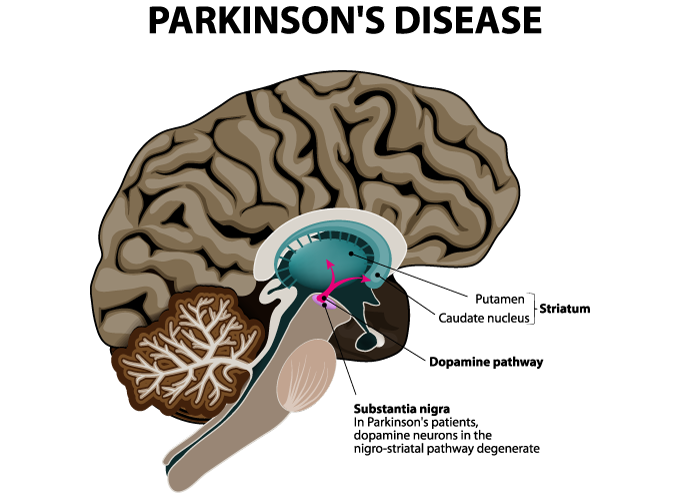Parkinson’s Disease
Parkinson's Disease
Parkinson’s disease is a progressive disorder of the nervous system that currently affects 1% of the American population. It spares race and is found in both men and women although is found to be most common in men. Parkinson’s typically affects older people aged between 50 and 65 though, in some rare cases, can also occur in younger adults.
Our brain controls and regulates everything in our body from our heart beat and nervous system to our ability to move, speak, run, or walk. The particular part of the brain that is responsible for controlling movement produces a combination of substances that work together to transmit messages from our brains to our muscles. In Parkinson’s disease, the cells that produce these substances begin to degenerate and die off causing the messages to become scrambled and the neurotransmitters to misfire resulting in uncontrollable muscle spasms and impairment in your ability to conduct controlled movements such as speaking, standing, lifting, or walking.
Researchers believe that genetics may play a significant role in the breaking down of these vital cells though it is still unknown as to exactly what triggers this breakdown to happen. Studies have also been conducted to determine whether or not it is a hereditary condition, and while some similarities in genetic abnormalities have been identified in families who have experienced more than one instance of the disease, not enough is known to confirm any correlation. In some very rare occasions, viral infection and exposure to environmental toxins may contribute to the development of the disease, but more research is needed.
In the early stages of the disease, it is often hard to notice signs such as a small tremor in the hands or stiffness in the limbs. Tremors are the involuntary contracting of muscles, which causes them to move or shake involuntarily. However, as the disease progresses, these symptoms worsen with shakiness becoming more evident, increasing in intensity and spreading. Muscle stiffness also increases causing a severe slowing down of movements and the impairment of simple tasks such as balance and walking.
Once the disease has developed, it may cause movements such as a “pill-rolling tremor” which is an involuntary rubbing together or back and forth movement of the fore finger and thumb, as though rolling a pill. Advanced Parkinson’s can create an intense stiffening of muscles which impairs your ability to move or bend your arms, hands, or legs. Other more advanced symptoms include the inability to conduct unconscious or automatic movements such as blinking, smiling, or swinging your arms when you walk. A failure to control speech, with words coming out too softly, too loudly, slurred, or slower than intended can also stem from advanced stages of the disease. Writing may become difficult or shaky, with letters being tiny. Your posture may become bent, and you may have difficulty balancing when standing up. You may notice a severe slowing down of your movements making simple actions such as getting out of a chair or walking awkward and time consuming. You may also notice that you drag your foot when you walk. All of these symptoms make living with Parkinson’s a very challenging experience, not only for those experiencing it, but also for the families who are helping care for them.
Having Parkinson’s means that there will be certain aspects of your life that will change, and you may come to rely on family and a care giver to help you get around, eat, and do other day-to-day tasks. At MDPDS our primary focus is on you. We care about the quality of your life and take the time to listen and understand your needs in an effort to design a tailored care and treatment program to help you manage your unique combination of symptoms life circumstances. Our team of compassionate, talented neurology experts will ensure you receive the best in exemplary care and that your day to day life is disrupted as little as possible.

Make an Appointment
There is no such thing as a one-size-fits all treatment. As such, we work closely with you to understand your unique circumstances and design care programs that fit your individual needs.
Use Telehealth
No matter where you are or what your movement disability may be, telehealth services ensure that we are always connected and able to assist you, 24/7.
